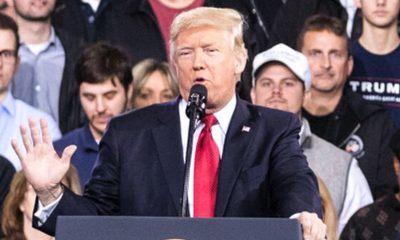National
Officer Stands Trial in 95-Year-Old’s Beanbag Shooting Death

Park Forest police officer Craig Taylor leaves a courthouse in Markham, Ill., Tuesday, Jan. 13, 2015, during a lunch break in the first day of his trial. Taylor is accused of acting recklessly by fatally shooting 95-year-old World War II veteran John Wrana with a beanbag gun at close range in an effort to subdue him at the assisted living facility where Wrana lived on July 26, 2013. (AP Photo/Sun-Times Media, Brian Jackson)
DON BABWIN, Associated Press
MARKHAM, Ill. (AP) — A suburban Chicago police officer had better and safer options than to fire beanbags to subdue a confused, knife-wielding 95-year-old World War II veteran, a prosecutor told the court Tuesday at the outset of the officer’s trial on a felony reckless conduct charge in the man’s death.
With all of their police equipment, training and “common sense,” Craig Taylor and the other Park Forest officers didn’t have to storm into John Wrana’s room at an assisted living center on July 26, 2013, Cook County State’s Attorney Lynn McCarthy said during her opening statements. They did so, though, and Taylor ended up firing five beanbags at Wrana, including the fatal one that struck his abdomen and caused internal bleeding, she said.
Taylor’s attorney, Terry Ekl, countered that Taylor did what he was trained to do to subdue a dangerous suspect who was coming at him with a knife. Wrana was determined enough that he kept coming at Taylor with a knife “over his head” until the final shot knocked it from his hand, Ekl told Judge Luciano Panici, who will decide the case.
Taylor, 43, could face up to three years in prison if he’s convicted. His trial comes amid heightened scrutiny of the use of deadly force by U.S. police departments, and there was a strong show of support by Taylor’s fellow officers Tuesday at the courthouse in Markham.
Unlike many criminal trials where there is a disagreement over exactly what happened, the prosecution and defense in Taylor’s trial agreed on the basic facts of the case in their opening statements.
Taylor was one of several officers dispatched to the facility where Wrana lived after a staff member reported that Wrana had become combative with emergency workers.
Wrana had hit a staffer with his cane and was brandishing the cane and a 2-foot long shoehorn. After officers left the room, they soon returned, with one carrying a Taser, another carrying a shield and Taylor armed with a 12 gauge shotgun that shoots beanbags. It was then that Wrana threatened the officers and refused to obey their order to drop a knife he had picked up.
One officer fired the Taser at Wrana, but missed. When Wrana moved toward Taylor with a knife, Taylor fired his weapon five times, according to prosecutors.
All of the shots were fired from no more than 8 feet away, said McCarthy, who told Panici that the “optimum distance” of 15 to 60 feet is spelled out in training standards and reminded the judge that each “projectile struck the 5-feet-five, 150 pound Wrana at about 190 miles per hour.
Wrana died from internal bleeding, according to the Cook County Medical Examiner’s office, which ruled his death a homicide.
One officer who showed to court in support of Taylor said that Taylor’s arrest is confusing to other police officers.
“There’s an outcry now for less lethal force in dealing with subjects and he used less lethal force,” said Mitchell Davis, the police chief in the nearby suburb of Robbins who once worked as an officer in Park Forest and said he knows Taylor. Davis said that while the incident had a “tragic outcome,” he believes Taylor acted properly.
As a result, he said, police officers are watching the case closely. But this case has not generated the kind of emotion that killings of unarmed black men, specifically in New York’s Staten Island and in Ferguson, Mo. Though Taylor is black and Wrana was white, neither attorney suggested race played any role in the shooting. Another factor is that the case is so unusual.
“This is so far afield from other cases that I don’t think it will have any wide ranging effect on police or have be any kind of deterrent to on-duty misconduct,” said Craig Futterman, a University of Chicago law professor who has studied and written about police abuse.
Copyright 2015 The Associated Press. All rights reserved. This material may not be published, broadcast, rewritten or redistributed.
Activism
Oakland Post: Week of December 31, 2025 – January 6, 2026
The printed Weekly Edition of the Oakland Post: Week of – December 31, 2025 – January 6, 2026

To enlarge your view of this issue, use the slider, magnifying glass icon or full page icon in the lower right corner of the browser window.
Activism
2025 in Review: Seven Questions for Assemblymember Lori Wilson — Advocate for Equity, the Environment, and More
Her rise has also included several historic firsts: she is the only Black woman ever appointed to lead the influential Assembly Transportation Committee, and the first freshman legislator elected Chair of the California Legislative Black Caucus. She has also been a vocal advocate for vulnerable communities, becoming the first California legislator to publicly discuss being the parent of a transgender child — an act of visibility that has helped advanced representation at a time when political tensions related to social issues and culture have intensified.

By Edward Henderson, California Black Media
Assemblymember Lori D. Wilson (D-Suisun City) joined the California Legislature in 2022 after making history as Solano County’s first Black female mayor, bringing with her a track record of fiscal discipline, community investment, and inclusive leadership.
She represents the state’s 11th Assembly District, which spans Solano County and portions of Contra Costa and Sacramento Counties.
Her rise has also included several historic firsts: she is the only Black woman ever appointed to lead the influential Assembly Transportation Committee, and the first freshman legislator elected Chair of the California Legislative Black Caucus. She has also been a vocal advocate for vulnerable communities, becoming the first California legislator to publicly discuss being the parent of a transgender child — an act of visibility that has helped advanced representation at a time when political tensions related to social issues and culture have intensified.
California Black Media spoke with Wilson about her successes and disappointments this year and her outlook for 2026.
What stands out as your most important achievement this year?
Getting SB 237 passed in the Assembly. I had the opportunity to co-lead a diverse workgroup of colleagues, spanning a wide range of ideological perspectives on environmental issues.
How did your leadership contribute to improving the lives of Black Californians this year?
The Black Caucus concentrated on the Road to Repair package and prioritized passing a crucial bill that remained incomplete during my time as chair, which establishes a process for identifying descendants of enslaved people for benefit eligibility.
What frustrated you the most this year?
The lack of progress made on getting Prop 4 funds allocated to socially disadvantaged farmers. This delay has real consequences. These farmers have been waiting for essential support that was promised. Watching the process stall, despite the clear need and clear intent of the voters, has been deeply frustrating and reinforces how much work remains to make our systems more responsive and equitable.
What inspired you the most this year?
The resilience of Californians persists despite the unprecedented attacks from the federal government. Watching people stay engaged, hopeful, and determined reminded me why this work matters and why we must continue to protect the rights of every community in our state.
What is one lesson you learned this year that will inform your decision-making next year?
As a legislator, I have the authority to demand answers to my questions — and accept nothing less. That clarity has strengthened my approach to oversight and accountability.
In one word, what is the biggest challenge Black Californians are facing currently?
Affordability and access to quality educational opportunities.
What is the goal you want to achieve most in 2026?
Advance my legislative agenda despite a complex budget environment. The needs across our communities are real, and even in a tight fiscal year, I’m committed to moving forward policies that strengthen safety, expand opportunity, and improve quality of life for the people I represent.
Activism
2025 in Review: Seven Questions for Assemblymember Tina McKinnor, Champion of Reparations, Housing and Workers’ Rights
In 2025, McKinnor pushed forward legislation on renters’ protections, re-entry programs, reparations legislation, and efforts to support Inglewood Unified School District. She spoke with California Black Media about the past year and her work. Here are her responses.

By Joe W. Bowers Jr., California Black Media
Assemblymember Tina McKinnor (D-Inglewood) represents
California’s 61st Assembly District.
As a member of the California Legislative Black Caucus (CLBC),
McKinnor was elected in 2022. She chairs the Los Angeles County Legislative Delegation and leads the Assembly Public Employment and Retirement Committee. McKinnor also served as a civic engagement director, managed political campaigns, and worked as chief of staff for former Assemblymembers Steven Bradford and Autumn Burke.
In 2025, McKinnor pushed forward legislation on renters’ protections, re-entry programs, reparations legislation, and efforts to support Inglewood Unified School District. She spoke with California Black Media about the past year and her work. Here are her responses.
Looking back on 2025, what do you see as your biggest win?
Assembly Bill (AB) 628. If rent is $3,000, people should at least have a stove and a refrigerator. It’s ridiculous that people were renting without basic appliances.
I’m also proud that I was able to secure $8.4 million in the state budget for people coming home from incarceration. That includes the Homecoming Project, the menopause program for incarcerated women, and the Justice Leaders Program.
How did your leadership help make life better for Black Californians this year?
After the Eaton Fire, I pushed to get the same kind of support for affected areas that wealthier regions get after disasters.
I also did a lot of work building political power— establishing the Black Legacy PAC and California for All of Us PAC so we could support Black candidates and educate voters. We also called voters to make sure they understood Prop 50.
People need to understand this: there are only 12 Black legislators in the Capitol. Folks act like we can just walk in and pass reparations, but that’s not how it works.
What frustrated you most this year?
The governor did not have the political will to sign these bills: AB 57 and AB 62. They both passed overwhelmingly in the Assembly and the Senate. We did the work. The only person who didn’t have the political will to sign them was the governor.
The public needs to ask the governor why he didn’t sign the bills. We can’t keep letting people off the hook. He has to answer.
I also introduced AB 51 — the bill to eliminate interest payments on Inglewood Unified School District’s long-standing state loan — held in the Appropriations Committee. That was frustrating,
What inspired you most in 2025?
The civil rights trip to Alabama was life changing. We visited the Legacy Museum and the National Memorial for Peace and Justice. We took members of the Black, Latino, Jewish, and API caucuses with us. It changed all of us.
People aren’t always against us — they just don’t know our history.
What’s one lesson from 2025 that will shape how you approach decisions next year?
The legislative trip to Norway taught me that collaboration matters. Government, labor, and industry sit down together there. They don’t make villains. Everybody doesn’t get everything they want, but they solve problems.
What’s the biggest challenge facing Black Californians in one word?
Inequity. It shows up in housing, wealth, stress – all these things.
What’s the number one goal you want to accomplish in 2026?
Bringing back AB 57 and AB 62, and securing money for the Inglewood Unified loan interest forgiveness.
-

 Bay Area4 weeks ago
Bay Area4 weeks agoPost Salon to Discuss Proposal to Bring Costco to Oakland Community meeting to be held at City Hall, Thursday, Dec. 18
-

 Activism4 weeks ago
Activism4 weeks agoMayor Lee, City Leaders Announce $334 Million Bond Sale for Affordable Housing, Roads, Park Renovations, Libraries and Senior Centers
-

 Activism4 weeks ago
Activism4 weeks agoOakland Post: Week of December 10 – 16, 2025
-

 Activism4 weeks ago
Activism4 weeks agoOakland School Board Grapples with Potential $100 Million Shortfall Next Year
-

 Activism4 weeks ago
Activism4 weeks ago2025 in Review: Seven Questions for Black Women’s Think Tank Founder Kellie Todd Griffin
-

 Arts and Culture4 weeks ago
Arts and Culture4 weeks agoFayeth Gardens Holds 3rd Annual Kwanzaa Celebration at Hayward City Hall on Dec. 28
-

 Advice4 weeks ago
Advice4 weeks agoCOMMENTARY: If You Don’t Want Your ‘Black Card’ Revoked, Watch What You Bring to Holiday Dinners
-

 Activism4 weeks ago
Activism4 weeks agoAnn Lowe: The Quiet Genius of American Couture






















































